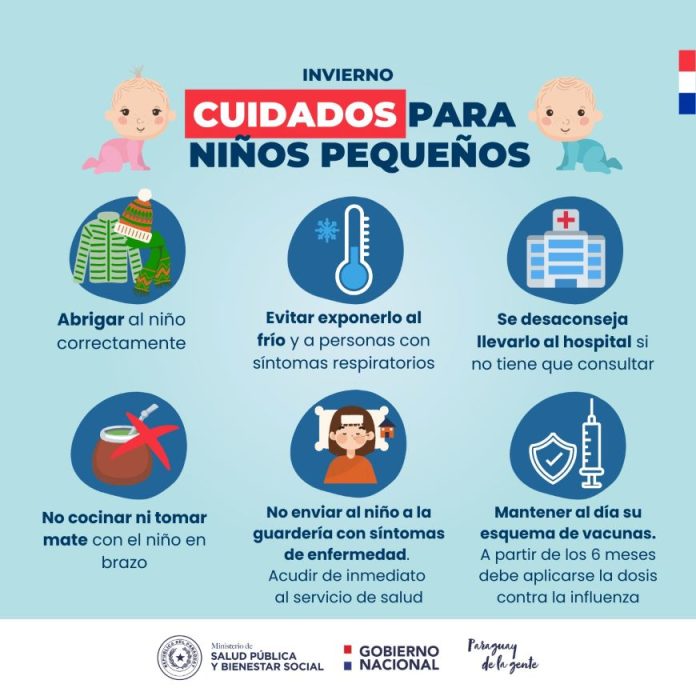
Protecting Children from Cold Weather and Respiratory Infections
Asunción, IP Agency – With the rise in respiratory virus infections, the Ministry of Public Health emphasizes the importance of properly sheltering children to maintain their body temperature. This helps to prevent them from being exposed to cold weather and individuals with respiratory symptoms, as children are particularly vulnerable to getting sick. It is advised not to take them to the hospital unless necessary.
Furthermore, if a child shows signs or symptoms of a respiratory illness such as fever, cough, skin rashes, vomiting, or discomfort, it is recommended not to send them to nursery or school to prevent the spread of the disease to other classmates. Breastfeeding should continue for infants.
Warning Signs to Watch Out For
- Troubled breathing or shortness of breath
- Bluish color of the skin
- Inadequate fluid intake
- Difficulty waking up or interacting with others
- Extreme irritability, resisting being picked up
- Flu-like symptoms that improve but return with fever and worsening cough
- Fever accompanied by a rash
It is crucial not to self-medicate the child and instead seek medical attention from a pediatrician. Delaying medical consultation can lead to complications in the child’s condition.
Vaccination
Keeping the vaccination schedule up to date is essential.
Children who receive their vaccines reduce the risk of intensive care unit admission by up to 74 percent. The influenza vaccine is available free of charge for the entire population, especially for individuals in high-risk groups:
- Children aged 6 to 35 months
- Health workers
- Pregnant and postpartum women
- People with underlying diseases
- Individuals aged 60 and above
Childcare providers should also be vaccinated against winter diseases.
Additionally, it is important to follow general recommendations to reduce the impact of acute respiratory diseases, such as washing hands with soap and water, practicing proper cough and sneeze etiquette, ventilating rooms, using face masks when experiencing symptoms, seeking medical consultation, and getting vaccinated.
Burn Prevention
- Avoid cooking or drinking mate with a child in your arms
- When preparing a bath for a baby or child, start with cold water and gradually add hot water
- Keep heat sources (stoves, braziers, etc.) out of children’s reach
- In case of burns, seek immediate medical attention
- Avoid applying substances (eggs, butter, homemade preparations, etc.) that may cause wound infection
In this content, the Ministry of Public Health in Asunción emphasizes the importance of protecting children from cold weather and respiratory infections. With the increase in respiratory virus infections, it is crucial to properly shelter children to maintain their body temperature and prevent them from being exposed to cold weather and individuals with respiratory symptoms. Taking children to the hospital should only be done if necessary. If a child shows signs or symptoms of a respiratory illness, such as fever, cough, skin rashes, vomiting, or discomfort, it is recommended not to send them to nursery or school to prevent the spread of the disease to other classmates. Breastfeeding should continue for infants. The content also mentions warning signs to watch out for, including troubled breathing or shortness of breath.
What are some warning signs to look out for when a child may be suffering from a respiratory infection
Some warning signs to look out for when a child may be suffering from a respiratory infection include:
1. Cough: If the child has a persistent cough that lasts for more than a few days or is accompanied by phlegm or mucus, it may indicate a respiratory infection.
2. Fever: A high fever is often a sign of infection, including respiratory infections.
3. Difficulty breathing: If the child is struggling to breathe or is breathing rapidly, it may indicate a more severe respiratory infection.
4. Wheezing: Wheezing, which is a high-pitched whistling sound when breathing, can be a sign of a respiratory infection.
5. Fatigue: If the child is unusually tired or lacking energy, it can be a sign that their body is fighting off an infection.
6. Loss of appetite: Respiratory infections can cause a loss of appetite or difficulty eating.
7. Runny or congested nose: A stuffy or runny nose, along with nasal congestion, can be a sign of a viral respiratory infection.
8. Sore throat: If the child complains of a sore throat or has difficulty swallowing, it may be a symptom of a respiratory infection.
9. Ear pain: In some cases, respiratory infections can cause ear pain or ear infections.
10. Rapid breathing or retractions: If the child’s chest appears to be sinking in or their ribs are visible with each breath, it may indicate respiratory distress requiring immediate medical attention.
It is important to consult a healthcare professional if any of these warning signs are observed in a child, as they can provide a proper diagnosis and recommend appropriate treatment.





![[건강하게 삽시다] heat and sweat [건강하게 삽시다] heat and sweat](https://149978254.v2.pressablecdn.com/wp-content/plugins/contextual-related-posts/default.png)


2 comments
Excellent article! These recommendations are crucial for parents to follow in order to protect their children’s health during the cold weather. Prevention is key and this provides great tips to avoid infections. Well done!
Great tips! It’s essential to prioritize the health of our little ones during cold weather. These recommendations will surely help parents keep their children healthy and protected from infections. Stay warm and safe, everyone! ❄️